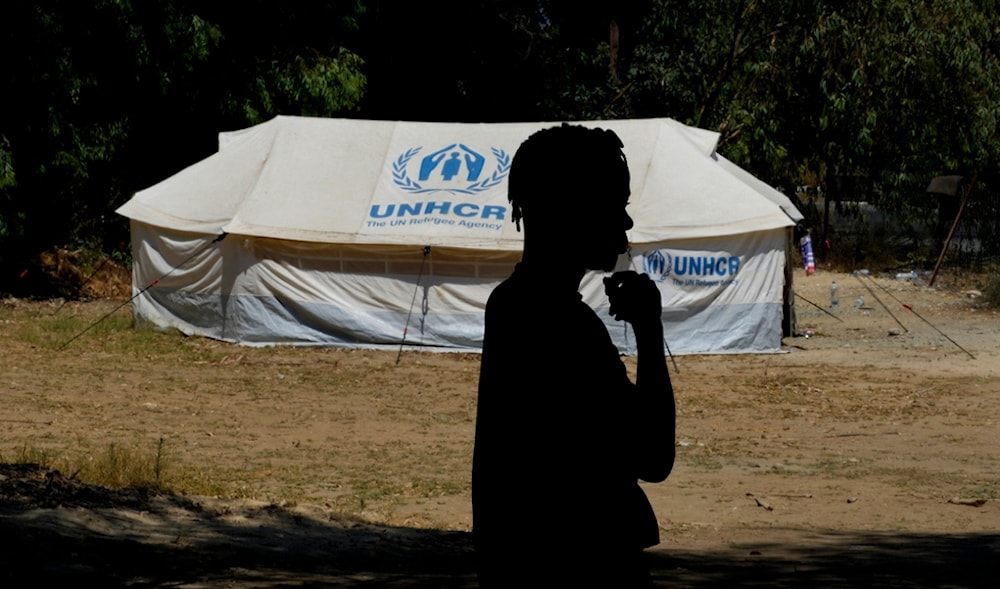Greece faces unprecedented challenges as child arrivals double in 2024
As unaccompanied minors continue fleeing to Greece, the government faces the challenge of adequately accommodating major numbers of refugees.
-

A refugee stands in front of a tent at a camp inside the UN-controlled buffer zone that divides the north part of the Turkish-occupied area from the south Greek Cypriots, Cyprus, on August 9, 2024. (AP)
The number of unaccompanied refugee children arriving in Greece continues surging, leading to a shortage of "safe zones" to house them, creating a growing crisis the country is challenged by, The Guardian reported on Monday.
In 2024, a significant number of children traveled along a new trafficking route from Libya to Crete, prompting NGOs to call for urgent action to provide shelters or transfer minors to other European Union countries.
Sofia Kouvelaki, head of the Home Project, described the situation as an unprecedented "children’s emergency." According to the UNHCR, child arrivals to Greece more than doubled in 2024 compared to the previous year, with over 13,000 minors arriving by sea and a sharp increase in unaccompanied children, from 1,490 in 2023 to approximately 3,000 in 2024.
"There are a huge number of kids turning up on boats every day and an urgent need for the creation of more safe spaces to house them," Kouvelaki stated.
Thereby, Greece is struggling to handle a growing influx of young refugee children, including exceptionally young arrivals from Syria and Egypt, according to the Home Project. Migration Minister Nikos Panagiotopoulos warned that migration pressures on Greece’s borders will likely persist into 2025, driven by ongoing wars, geopolitical unrest, and the climate crisis, which have forced many to flee their homes.
Massive influx calls for reform
By the end of 2024, an estimated 60,000 migrants are expected to have entered Greece, overwhelming reception camps on the Aegean islands. Aid groups report hundreds of children on islands like Samos, Leros, and Kos are without standard necessities such as clothing, shoes, and access to essential services. Budget cuts under Greece's "strict but fair" migration policy have reduced protective shelters, leaving 1,500 unaccompanied minors to fend for themselves.
Moreover, overcrowding in state-run facilities has manifested increasing incidents of violence and abuse, shedding light on a case of gang rape and assault on an Egyptian teenager at the Malakasa refugee camp, which has drawn public outrage. Meanwhile, child arrivals from Tobruk, Libya, surged by 400% over the past year.
In light of the implications, officials have announced plans to create 500 additional places for children in shelters, contingent on securing funding.
Is the system crumbling?
Aid organizations, including Save the Children, have criticized Greece’s refugee reception system for critical failures, including overcrowded camps and insufficient basic services such as interpreters and guardians.
These shortcomings have left children vulnerable, with many asylum requests delayed. Migrant solidarity workers additionally noted that EU funding for shelters in 2024 had been significantly delayed, worsening the situation.
The government recently announced an agreement to address the interpreter shortage. However, Lefteris Papagiannakis, director of the Greek Council for Refugees, warned that systemic failures affect the entire operation, stating it was unacceptable for such basic issues to persist despite significant financial investment.
A recent report by the Greek Council for Refugees and Save the Children highlighted the "alarming" living conditions for minors in camps, while NGOs have called on authorities to prioritize early integration for asylum-seeking children and urgently enforce child-protection measures.
Greece scolded for mistreating minor asylum seekers
In January, the EHCR ruled against the Greek government following its failure to protect an Afgan teenage asylum seeker who arrived in Greece in 2018 and was left homeless for the six months that followed.
It was revealed that the minor was fending for himself without any cooperation or governmental aid in an unsafe environment that did not provide basic life necessities like hygiene, accommodation, food, and more.
By the end of 2020, following insistence from the United Nations, Greece developed protection systems that took in asylum seekers, indicating that most of them have been residing in Greek shelters.
Read more: Migrant crisis could cause collapse of EU: The Telegraph

 4 Min Read
4 Min Read








